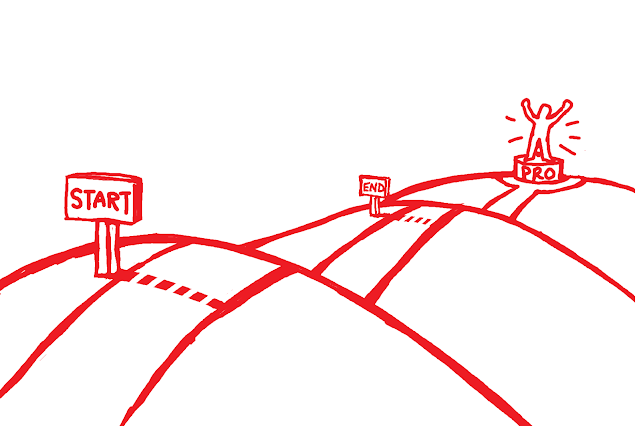Ok, so now what?
It can be a little intense when you reach a big milestone like the completion of a program. You've been in a structured setting with a focused team, working on established tasks, within a prescribed timeline. Suddenly you reach the finish line. After running so hard for so long, you're not sure what to do next. It can feel very lonely, aimless and overwhelming.
Take heart: you are not alone.
First, look behind you and reflect upon what started you on this path in the first place. Recall what you were hoping to learn. Along the way you likely discovered skills you didn't even know existed! Look at the very first example of work you created in the program. Maybe a drawing, a simple model or an animation. That was where you started.
Second, look at where you are right now. Give yourself a moment to take a breath and reflect. Compare that earlier work to your favorite piece you've made in your time here. Quite an improvement from where you started, right? Even if you're starting to think you want to pivot in a new direction it's helpful to acknowledge what you've accomplished so far.
Third and finally, take a look forward. What do you still want to learn? Have you started thinking about the next big objective? There may be lot of work to reach that next milestone but now you've gathered yourself and are pointing in the right direction: forward.
I've curated a few helpful hints and resources to help you proceed without my constant nagging and noodling. I've organized them into 3 core concepts:
Make a plan, One step at a time, and Help each other.
Be sure to check out Fraeya's Google Sheet "I've Graduated, Now What?"
Make a Plan
- What are your objectives?
- What are the milestones to get there?
- How much can you actually get done in a day? (Plan for 6 hrs. of actual productive work maximum)
- Where can you get help and feedback?
- You'll want to include professional networking, job search and application in your checklist each week.
- More content
- Demo reel
- Online profile/website/brand
- Identify where to get help/support.
Motion Capture (Andrew West, Start and Finish)
Games Animation Set (Kyle Remus)
Dance or Paired animation (Lana Bachynski) (Marco Sarandi)
Demo Reel
5 Burning Questions About Demo Reels by Shawn Kelly
Three Inventories of a DemoReel/Portfolio by Nate Walpole
Online Profile/Portfolio/Branding
20 steps to a better LinkedIn profile in 2022 by Jane Deehan
Other useful forums:
Polycount Forums
Highend3d
Take One Step at a Time
There is only one way to eat an elephant: one bite at a time. Break overwhelming tasks into their simpler bits - things that can be done in a day. This way you can plan milestones and enjoy having a sense of your progress.
Now on to lighting and rendering. Remember to break the steps down a bit for every task. Day long, 'bite size' chunks are best and you'll be devouring elephants with the best of them.
Help Each Other
Everything works better when you work in a group. Meet 2x/ week for 1 hour and share your progress. Commit to a fixed time, based on a class time slot you were already available.
Use SyncSketch to look at each other's work.
Post links to the #3d-anim-showoff-feedback channel.
Discord - keep using the correct channels.
Job hunt collaboratively. Post anything you apply for, recommend each other. sign up for CreativeHeads.net, etc
Creative Heads (https://www.creativeheads.net/)
Game Developer (https://jobs.gamasutra.com/)
LinkedIn (https://www.linkedin.com/jobs/)
Zerply (https://zerply.com/jobs)
8 websites for freelance animators to find work
Animation, VFX and Games Industry Job Postings
for currently enrolled students, there are resources at
Fanshawe's Career services site
Alums, need to register for access here:
anshawec.ca - Alumni Registration
myfuture.fanshawec.ca - myAccount
They also link to the following outside resources
Level UP - Gov't sponsored. Paid short term remote work
Fanshawe Leap, Entrepreneurial services
If you want to take care of others, you'll need to take care of yourself too.
Remember the basics:
- Take a 10m break every hour. Drink lot of water
- Get up and move around
- Try to get your 8 hrs. of sleep.
- If you're struggling, there are resources to help you: Canadian Mental Health Association.
You may not be in my class, but that doesn't mean I never want to hear from you. Connect with me on LinkedIn so I can see how you're doing. Send me a SyncSketch link of your work in progress, or even your demo reel. As my time allows, I always like to offer an opinion.
You have all the tools you need. You've got this.
 |
| inspirational baby believes in you and so do I. |



